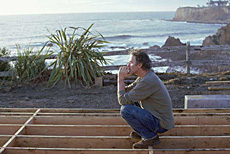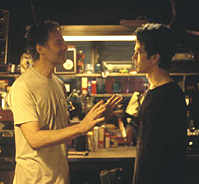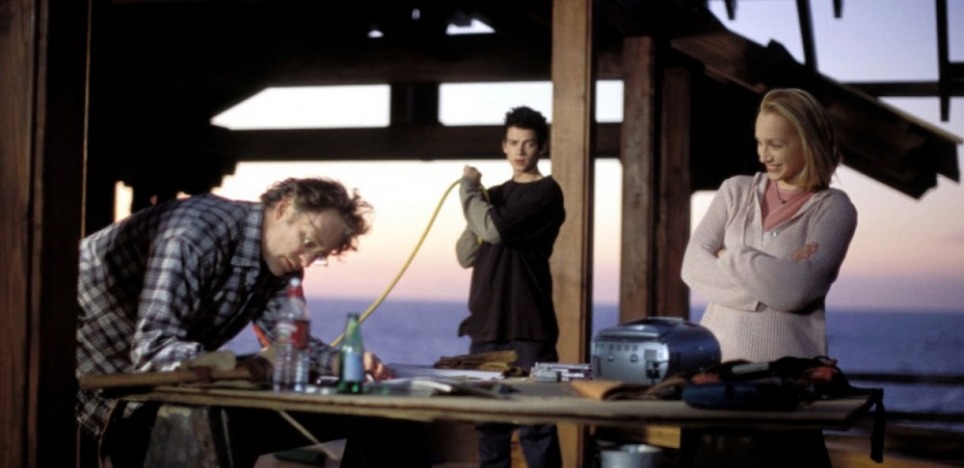In his 1998 book A Year to Live, Stephen Levine gave an account of what happened when as an experiment he lived for one year as if it were his last. The results were impressive: He became much more conscious of his states of mind and much more attentive to the bounties of the present moment. This radical spiritual project resulted in an inner transformation, causing him "to sharpen life and soften death."
Over the years, numerous movie plots have revolved around a character's personal renewal in the face of a terminal illness or some other catastrophic event. Often these films have been criticized or minimized as "TV movies about the disease-of-the-week," “tear-jerkers,” or "creative cop-outs" as if the writer couldn't think of any other way to effect change in the characters. But instead of writing off such stories, we have consistently regarded them as opportunities to ponder afresh the process of seeing adversity as an occasion for spiritual transformation. This motif is emphasized in all the world's religions.
We hope that the questions and exercises in this Values & Visions Guide to Life as a House will "sharpen life and soften death" for you. There are thematic considerations of personal renewal, release from the prison of old tapes, the art of deep listening, the importance of touch, helping those who are homeless in their hearts, achieving simple and profound intimacy, and making your death fruitful for others. For our review of the film and a plot synopsis, click here.
Life as a House runs 124 minutes and is rated R for language, sexuality, and drug use.

1. BUILDING SOMETHING NEW
"There is nothing like a serious illness to blow down our fragile houses of sticks and straw," notes Kat Duff in The Alchemy of Illness. "Standing amid the rubble of their lives and thoughts, people with serious illnesses undertake the task of building a new house, a new way of living, one that holds closer to the ground of being, the feedback and teachings of their bodies and souls."
- What do you learn about George Monroe in the opening sequence of events at his home and at work? What would you say is the symbolic meaning of his project of building a new house?
- Talk about a serious illness or setback that has forced you to change or reinvent yourself. Respond to the spiritual outlook that says: "Out of every crisis comes the chance to be totally transformed; to be reborn."
2. SMASHING THE MIRROR
French writer and diarist Anais Nin once observed: "One discovers that destiny can be directed, that one does not have to remain in bondage to the first wax imprint made on childhood sensibilities. Once the deforming mirror has been smashed, there is a possibility of wholeness."
- Discuss the various ways George's terrible and painful relationship with his father has impacted his entire life.
- What negative experiences from your childhood have you allowed to be important stories still influencing you today? What new stories help you smash the “deforming mirror”?

3. HOMELESS IN THEIR HEARTS
"There are so many young people who are homeless," Thich Nhat Hanh observes in Going Home: Jesus and Buddha as Brothers. "They may have a building to live in, but they are homeless in their hearts. That is why the most important practice of our time is to give each person a home. Be a home for them. Each of us has to serve as the home for others."
- What lies behind Sam's anger and fear? Describe the person he has made himself into in order to stay isolated from others. In what ways does George become a home for his son?
- Do you know any young people who are homeless in their hearts? When have you served as a sanctuary or resting place for others?

4. REALLY BEING WITH THE OTHER PERSON
"Listening means being empty of self-importance and reacting to what we hear with empathy. It is both an art and a skill, just as much as speaking is. It requires really being with the other person. Just listening with total attention to what is being said, without making up our own story about it, without our mental chatter, is part of compassion," Ayya Khema writes in Be An Island.
- What character traits make both George and his son Sam poor listeners? While they are living together they both begin to learn more about the spiritual practice of listening. Which scenes in the drama stand out in your mind as instances when someone demonstrates the art of really being with another person?
- Which of the following hindrances to deep listening have been a problem for you: your self-importance, your making up stories while someone else is talking, your mental chatter? Or is there another block? Name the last person who impressed you with her or his total attentiveness to what you were saying?
5. TOUCH IS ELEMENTAL
"They're all grand — hearing and smell and sight and taste, but touch — touch is elemental. There's no kidding about touch; touch is a biological necessity without which the body as well as the soul falters," Sherry Cohen states in The Magic of Touch.
- Describe your feelings during the scene when a nurturing nurse touches George in a tender way while he lies in a hospital bed. Share your reactions to the hugs George gives to all those helping him build his house.
- Touch has been called the oldest sense and the most urgent one by poet and essayist Diane Ackerman. What are your family's attitudes toward touching, hugging, and kissing? Do you share them? When have you experienced “healing” touch?

6. THINGS THAT MATTER MOST
"The things that matter most in our lives are not fantastic or grand. They are moments when we touch one another, when we are there in the most attentive or caring way. This simple and profound intimacy is the love that we all long for," Jack Kornfield has said.
- What draws George and his ex-wife Robin back together in a dance of intimacy? What other characters are yearning for someone to be there for them in an attentive or caring way?
- Share an example of a moment when you experienced the kind of intimacy Kornfield is talking about.
7. DYING WELL
"Dying well means dying for others, making our lives fruitful for those we leave behind," Henri J. M. Nouwen wrote in Bread for the Journey.
- What unfinished business does George take care of while building his house with his family? Share your reactions to the ways he makes his death fruitful for those he leaves behind.
- What do you hope your legacy will be?
This guide is one in a series of more than 200 Values & Visions Guides written by Frederic and Mary Ann Brussat. Text copyright 2001 by Frederic and Mary Ann Brussat. Photos courtesy New Line Cinema. This guide is posted as a service to visitors to www.SpiritualityandPractice.com. It may not be photocopied, reprinted, or distributed electronically without permission from Frederic and Mary Ann Brussat — except it may be duplicated for use by groups participating in the e-course "Going to the Movies as a Spiritual Practice." For other uses and for a list of guides in the Values & Visions series and ordering information, email your name and mailing address to: brussat@spiritualrx.com.
